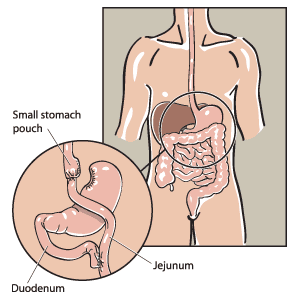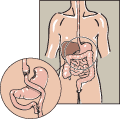Description of the procedure
Gastric bypass surgery reduces the size of a person's stomach and bypasses parts of the small intestine. It helps people who are obese or very obese lose weight because the stomach holds less food and the length of the small intestine is reduced so fewer calories are absorbed. Gastric bypass surgery is also known as bariatric surgery.
Generally, it is best to achieve weight loss goals by changing your diet and increasing regular physical activity. However, people who meet specific conditions and have tried other methods of weight loss may benefit from gastric bypass surgery.
The procedure takes place in a hospital under general anesthesia.
When should this procedure be performed?
This procedure is usually performed only once to help a person lose weight.
Why is this procedure performed?
This procedure may be appropriate if a person has a body mass index (BMI) of:
- 40 or more; or
- 35 or more, along with certain conditions that affect their health (e.g., type 2 diabetes or heart disease)
BMI measures a person's weight relative to their height. A healthy BMI range is 18.5 to 24.9.
Are there any risks and precautions?
Certain risks are common to all surgery and anesthesia. These risks depend on many factors including the type of surgery and your own medical condition. The possible, but very rare, side effects include: side effects of the anesthetic, breathing problems, infection, bleeding, scarring, and death.
Although gastric bypass surgery is generally considered safe, it does have some risk of side effects or complications. These include:
- necessity for further procedures to improve any problems that result from the surgery
- gallstones
- hernias
- inflammation or ulceration of the stomach lining
- certain vitamin or mineral deficiencies (e.g., vitamin B12, iron, calcium)
- vomiting
- dumping syndrome (a condition where food moves too quickly from the stomach to the intestine, leading to nausea, diarrhea, abdominal cramps, sweating, feeling faint, and heart palpitations)
- eventual stretching of the new stomach "pouch" to its original size
- bowel obstruction
If you experience these side effects or complications, contact your doctor immediately.
If you experience severe abdominal pain, fever, shortness of breath, or are vomiting blood after the surgery, get immediate medical attention.
If you are concerned about any symptoms following this procedure, speak to your doctor. Take the time to be sure you understand all the risks of complications and side effects as well as any precautions you or your doctor can take to avoid them. Be sure your doctor understands all your concerns.
What happens during the procedure?
Various types of gastric bypass surgery exists, but they’re all done in the hospital, under general anesthesia, and basically consists of two parts.
- The stomach is made smaller using stitches, bands, or staples. This is called restrictive surgery because it restricts the stomach to about the size of a walnut.
- Part of the small intestine is bypassed. Part of the lower section of the small intestine is connected to the stomach pouch. This shortens the length of bowel that food travels through, so fewer calories and nutrients are absorbed.
The procedure usually takes about 2 to 4 hours.
How should I prepare for this procedure?
Before having this procedure, discuss the advantages, disadvantages, long-term risks, and consequences associated with the procedure with your doctor. Be sure you fully understand what will happen and are comfortable with your doctor's answers to your questions.
To be eligible for the procedure, you must be committed to leading a healthy lifestyle and making changes to continue to improve your health after the procedure. You will have to complete medical and psychological evaluations and receive nutritional counselling.
Do not eat for 8 hours before the procedure. You may be able to continue to drink clear liquids until 2 hours before the procedure. If your doctor has recommended different times, follow the timing recommended by your doctor.
Tell your doctor or prescriber about all prescription, over-the-counter (non-prescription), and herbal medications that you are taking. Also tell them about any medication allergies and medical conditions that you may have. Arrange for someone to drive you home from the hospital.
Ask your doctor or pharmacist whether you need to stop taking any of your medications before the procedure.
What can I expect after the procedure?
After surgery, you will be awakened in the recovery room. You will likely feel groggy, sore, and possibly nauseated. You may have pain and feel uncomfortable. This is normal. Your doctor will likely recommend pain medication. After the surgery, you will stay in the hospital, usually for 3 to 5 days. Before you go home, the doctor or nurse will go over what you need to do at home to complete your recovery.
As your stomach begins to heal, it is important to follow the diet that is recommended (usually a liquid and soft-food diet). Returning to regular foods takes a few months.
Vomiting after meals is common. It happens because your stomach now holds a much smaller amount of food. To prevent vomiting after meals, you should:
- eat smaller meals, several times during the day
- avoid combining liquids and solids when you eat
The procedure itself is only one part of the weight loss process. Your doctor can help you determine what lifestyle changes you need to make to reach and maintain a healthy weight. You may find it helpful to speak with a nutritionist about healthy eating.
You will start walking around shortly after surgery. However, you should wait 6 weeks post-surgery before exercising again. Check with your doctor about what timeframe is safe for you, and which exercises he or she recommends for you.
Once you reach a healthy weight, maintaining it is critical. Your doctor may suggest you partake in some weight maintenance programs. Making healthy choices at the grocery store, at a friend's house, or in a restaurant can help you keep the weight off.
Results
By reducing the size of your stomach, you will feel full more quickly. Bypassing parts of the small intestine means that not as many of the calories you eat will be absorbed. Both these factors help with weight loss. The fastest rate of weight loss happens shortly after the surgery while you are restricted to a liquid diet. Then weight loss continues steadily until you reach a stable weight (usually after about two years).
All material copyright MediResource Inc. 1996 – 2024. Terms and conditions of use. The contents herein are for informational purposes only. Always seek the advice of your physician or other qualified health provider with any questions you may have regarding a medical condition. Source: www.medbroadcast.com/procedure/getprocedure/Gastric-Bypass-Surgery




